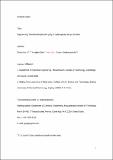Engineering Yarrowia lipolytica for poly-3-hydroxybutyrate production
Author(s)
Li, Zhengjun; Qiao, Kangjian; Liu, Nian; Stephanopoulos, Gregory
Download10295_2016_1864_ReferencePDF.pdf (404.5Kb)
OPEN_ACCESS_POLICY
Open Access Policy
Creative Commons Attribution-Noncommercial-Share Alike
Terms of use
Metadata
Show full item recordAbstract
Strains of Yarrowia lipolytica were engineered to express the poly-3-hydroxybutyrate (PHB) biosynthetic pathway. The genes for β-ketothiolase, NADPH-dependent acetoacetyl-CoA reductase, and PHB synthase were cloned and inserted into the chromosome of Y. lipolytica. In shake flasks, the engineered strain accumulated PHB to 1.50 and 3.84% of cell dry weight in complex medium supplemented with glucose and acetate as carbon source, respectively. In fed-batch fermentation using acetate as sole carbon source, 7.35 g/l PHB (10.2% of cell dry weight) was produced. Selection of Y. lipolytica as host for PHB synthesis was motivated by the fact that this organism is a good lipids producer, which suggests robust acetyl-CoA supply also the precursor of the PHB pathway. Acetic acid could be supplied by gas fermentation, anaerobic digestion, and other low-cost supply route.
Date issued
2016-11Department
Massachusetts Institute of Technology. Department of Chemical EngineeringJournal
Journal of Industrial Microbiology & Biotechnology
Publisher
Springer-Verlag
Citation
Li, Zheng-Jun, Kangjian Qiao, Nian Liu, and Gregory Stephanopoulos. “Engineering Yarrowia Lipolytica for Poly-3-Hydroxybutyrate Production.” Journal of Industrial Microbiology & Biotechnology 44, no. 4–5 (November 8, 2016): 605–612.
Version: Author's final manuscript
ISSN
1367-5435
1476-5535